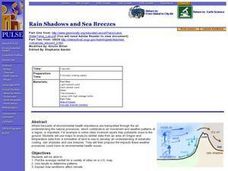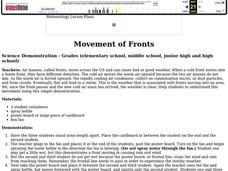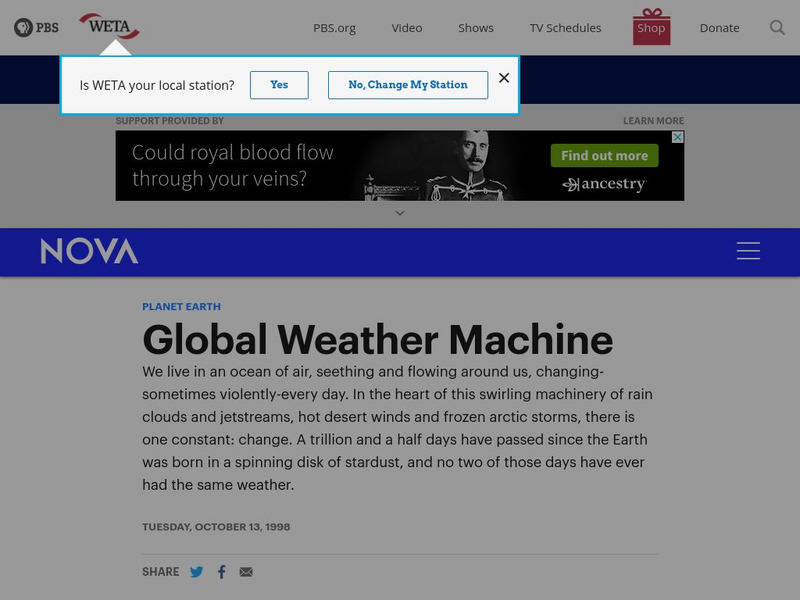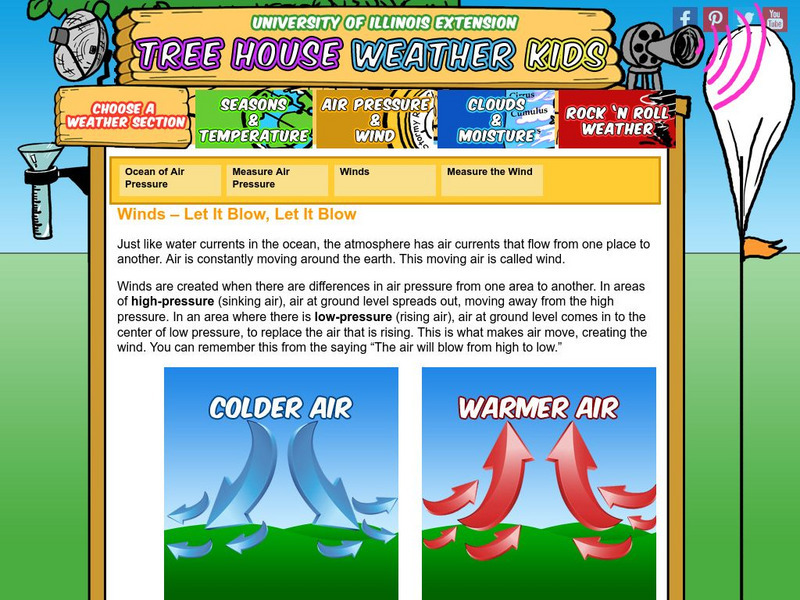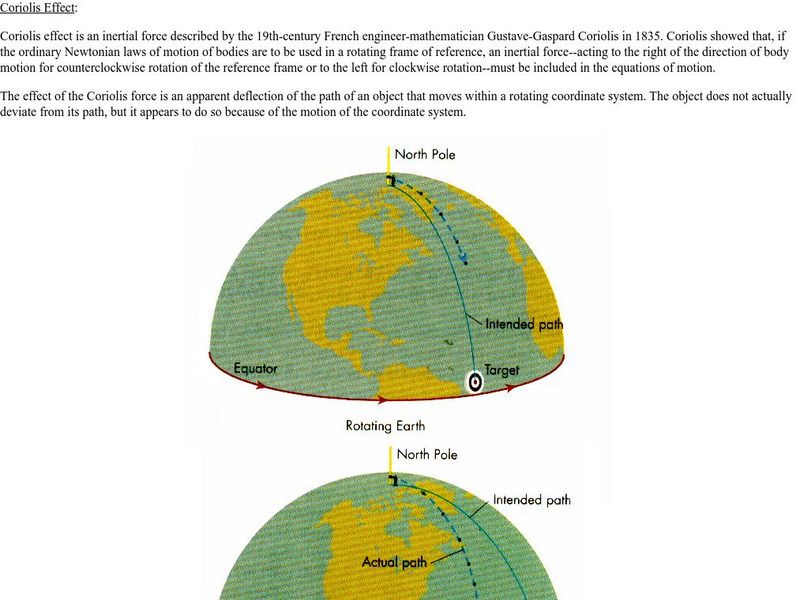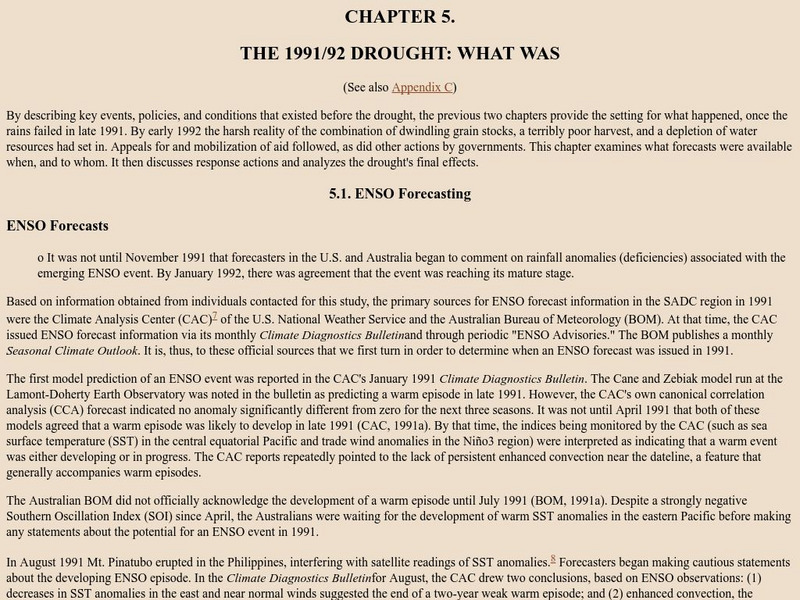Curated OER
Science - 'Why does the wind blow?'
In this earth science worksheet, students read a poem about the wind and learn why the wind blows. After reading the poem and informative paragraphs that follow it, students answer 2 questions regarding the information they read....
Curated OER
Rain Shadows and Sea Breezes
Students plot the average rainfall for a variety of cities in the United States. Using the map, they work together to determine patterns on which toxicants are transported through the air. They determine the impacts of various weather...
Curated OER
Air Movement
Students observe a series of teacher-led demonstrations about air movement. They explain the existence and movement of air, then list 3 things that they have learned about air. Finally, students go outside and shoot off air cannons.
Curated OER
Air Masses & Fronts
Students identify two distinct air masses and the frontal boundary and determine whether the front is moving in time and in what direction the front is moving.
Curated OER
How is Sound Made?
In this sound worksheet, students will fill in the blank of 4 facts based on what sound different objects make. Based on those facts, students will write in a conclusion about how sound is made.
Curated OER
Winds Over Land vs. Ocean
Students explore friction and the way it impacts wind over the ocean compared to over land.
Curated OER
Movement of Fronts
Students use a demonstration in order to learn abou the movement of weather fronts.
Smithsonian Institution
Smithsonian Learning Lab: How Things Fly: Activities for Teaching Flight
Through this series of three lessons, students will gain an understanding of the basics of flight. They will learn about the four forces of flight and practice their observation skills through a number of fun experiments. In addition,...
BioEd Online
Bio Ed Online: Respiratory System
In the following lessons for k-5 students are introduced to the structures within the human respiratory system.
Other
University of Windsor: Climates on a Rotating Earth
This site offers the text of a college lecture on the atmosphere, with information on the effect prevailing westerlies have on North America.
Other
Science4 Us: Weather
The Weather module allows students to explore Earth's ordinary and extreme weather in safety. Activities include using the weather information to decide what an online character should wear and learning about how to stay safe during...
University of Arizona
Pulse: From Global to City Air: Air Quality, City Design and Disease
Learners are challenged to design a healthy city in this unit plan. The cross-curricular unit covers content standards for ninth grade in science, language arts, world geography, and math. Students explore air quality and the impact it...
University of Illinois
University of Illinois Urbana Champaign: Ww2010: Forces and Winds: Pressure Gradient Force
Explains what a pressure gradient is and how it produces air movement.
Science Education Resource Center at Carleton College
Serc: High and Low Pressure
Students will experience a hands on reference for high and low pressure as it relates to air movement. This activity will help with understanding high and low pressure behavior.
PBS
Pbs Kids: Dragonfly Tv: Do It: Amazing Air!
PBS site sets up an investigation that you can do at home to see the effects of invisible air.
USA Today
Usa Today: Jet Stream Roars Along High Above Earth
A good explanation of the jet stream is offered with links to other related information.
Other
Cornerstone Networks: Fourth Grade Science Lesson 1
This site, designed as a fourth-grade lesson, focuses on the earth's atmosphere with information on prevailing winds.
PBS
Pbs/global Weather Machine
This site explains wind systems as part of a global weather scheme, with illustrations.
University Corporation for Atmospheric Research
Ucar: Fact Sheet for El Nino
This site from the Univ. Corp. for Atmospheric Research provides detailed information on El Nino and its effects on the trade winds is offered at this site, with satellite photos.
NASA
El Nino: Making Sense of the Weather: Global Wind Patterns
This is an educational site offered by NASA that has information on global winds, including prevailing westerlies, with illustrations. Included is a short activity to illustrate the winds.
NASA
Nasa: Global Wind Patterns
This site from NASA lists and defines global wind patterns. It features a graphic of these patterns and a self-test with answers.
University of Illinois
University of Illinois Extension: Tree House Weather Kids: Air Pressure and Wind: Winds: Let It Blow
Animated interactive helps young researchers understand how winds develop.
University of Oregon
University of Oregon: Coriolis Effect
This site from the University of Oregon provides a great explanation of the Coriolis Effect and then gives several chart type examples to help the understanding of it.
University Corporation for Atmospheric Research
Ucar: The 1991/1992 Drought
This site from the University Corporation for Atmospheric Research offers information on drought and global climate conditions, with an explanation of the trade winds.



